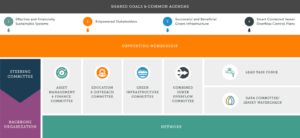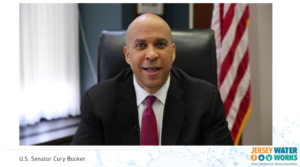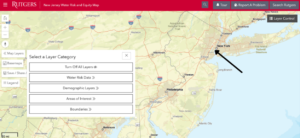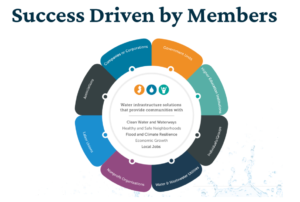Jersey Water Works members connect to prioritize water infrastructure in this historic funding moment
Elected officials and community voices echoed the same sentiment: New Jerseyans must continue to work together to transform water infrastructure at this historic moment. For the seventh year in a row, Jersey Water Works (JWW) members met to explore “Different Perspectives, New Opportunities, and Win-Win Solutions” to New Jersey’s water challenges. The annual JWW Membership Meeting was held virtually on July 28. With the potential share of federal funds that New Jersey is anticipated to receive, 160 attendees assembled to discuss how we can collectively take advantage of this opportunity.

The meeting gathered honorary co-chairs and former NJ governors Christine Whitman and James Florio to recognize JWW’s outgoing co-chairs, Mark Mauriello and Jane Kenny, as they transition to their honorary titles. The governors thanked Mauriello and Kenny for their dedication to the collaborative as co-chairs for the last six years and for establishing it as the changemaking agent it is today. The governors also welcomed the new leadership, Nicole Miller* and Andy Kricun* **, as they take on the leadership role to lead the collaborative efforts.
U.S. Senator Cory Booker thanked JWW members for their “collaborative efforts to improve New Jersey’s

communities” in recorded remarks. Booker has recently introduced a bill with $25 billion to address combined sewer overflows “particularly in economically distressed communities.” The bill also includes $45 billion to replace lead services lines throughout the country. Booker calls this a critical funding that not only impacts the environment, but also is necessary for the public health and economic vitality of the state.
Next, a panel moderated by Lester Taylor* **, and featuring Ed Potosnak*, Christine Ballard**, Jose Amarante, and NJ Senator Linda Greenstein shared their diverse perspectives on how to move the water infrastructure sector forward. The meeting wrapped up with three breakout sessions facilitated by JWW committee leaders where attendees discussed financing water infrastructure, the power of data, and community engagement.
Four key takeaways from the 2021 JWW Membership Meeting:
- JWW Committees and members are making progress in 2021. Highlights include:

Image of the Water Risk and Equity Map
- A letter to all New Jersey mayors to highlight the importance of including water in their American Rescue Plan projects.
- A letter to the Governor’s office, DCA, BPU, and other state leaders to educate them about the important need for a low-income water assistance program.
- Launch of the New Jersey Water Risk and Equity Map, an informational mapping tool that shows general patterns of water risk and demographic trends.
- Release of new videos—and accompanying blog posts on safe drinking water and wastewater treatment—detailing metrics on Jersey WaterCheck, the collaborative’s shared data dashboard.
- Review of the NJDEP technical response letters to the Long Term Control Plans and recommendations for the next cycle of permits to help ensure equity and environmental and community benefits.
- “We are in a significant moment for water infrastructure.” Several recent bills that advance JWW shared goals have been introduced or signed into law by Governor Murphy. During the panel, Senator Greenstein described her legislative initiatives to achieve clean waterways and affordable water includings the Water Quality Accountability Act (2017) and recent amendments (S647, which awaits the governor’s signature), the Clean Water and Flood Reduction Act, which authorized stormwater utilities and a landmark law to require the removal of lead service lines. She has also sponsored a new law to create a statewide affordability program. “Water is earth’s resource… it’s everyone’s responsibility to take care of it,” said Senator Greenstein.
- Community members are experts, and those who are experiencing water challenges understand them better than anyone. Jose Amarante knows that there can be a disconnect between decision-makers and community members, and thus, public engagement is essential for successful projects that have environmental, social, economic, health, and community benefits. “Even if local leaders have money, they may not listen to local community members who know where it floods the most,” said Amarante. Fellow panelist Christine Ballard echoed these remarks, emphasizing that educating decision-makers on community and utility water needs is essential. According to Ballard, “access to clean waterways and safe drinking water should not be a privilege. It should be a universal truth.”
- Much needed federal funding may be coming to NJ. Modernizing the water systems that have suffered from years of disinvestment requires sufficient funding and long-term sources of it. During the panel, Ed Potosnak provided a summary of the American Rescue Plan and the federal bipartisan infrastructure proposals that are under review. The purpose of such proposals is to create millions of local union jobs and rebuild the country’s infrastructure over the next ten years. The infrastructure proposals that feature water projects also include a focus on disenfranchised communities. Potosnak explained that over the next 20 years, New Jersey would require an additional $8 billion to address the D+ grade that our systems received in the latest infrastructure report card. Knowing this, many New Jersey organizations are working with partners to push for critical water legislation. While JWW does not take positions to oppose or support local, state, or federal legislation or formal executive actions, members can take action in their own name.

As a result of the Membership Meeting being open to the public, Jersey Water Works is excited to welcome thirteen new members to the collaborative. Did you miss the Membership Meeting? Visit the new JWW website to check out the event highlights, partner updates, meeting materials, and the recording. For those not involved yet, we invite you to find your unique role.
* JWW Steering Committee member
** JWW committee co-chair